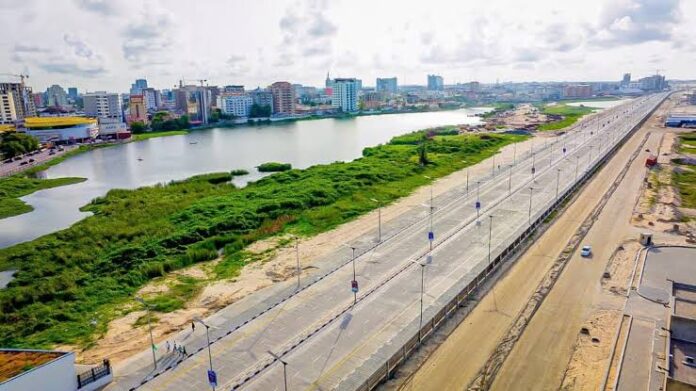The rhythmic pounding of pile drivers along Nigeria’s coastline marks more than just physical construction—it heralds a financial revolution. On July 10, 2025, Nigeria secured a $747 million syndicated loan, led by Deutsche Bank, to accelerate the Lagos-Calabar Coastal Highway, Africa’s most ambitious infrastructure project. This isn’t merely about asphalt and concrete; it’s a case study in sophisticated infrastructure financing that blends global capital with local vision. For Nigeria’s 220 million people, this 700-kilometer corridor represents a tangible lifeline—promising to slash Lagos-Calabar travel from days to hours while testing the boundaries of public-private partnership in emerging markets.
The Financing Blueprint: Deconstructing the Deal
The Syndicate Symphony
This landmark transaction—Nigeria’s largest-ever road infrastructure loan—is structured as a multi-layered financial ecosystem: Global Coordination with Deutsche Bank as Global Coordinator, Mandated Lead Arranger, and Bookrunner; Regional Integration through ECOWAS Bank for Investment and Development ($100 million commitment); Risk Mitigation via Islamic Corporation for Insurance of Investment and Export Credit (ICIEC) providing political risk coverage; and Commercial Backbone from First Abu Dhabi Bank (Agent/Intercreditor), Afreximbank, Zenith Bank (UK/Paris/Nigeria), and Abu Dhabi Exports Office.
| Institution Type | Key Players | Strategic Role |
|---|---|---|
| Global Commercial Banks | Deutsche Bank, First Abu Dhabi Bank | Capital mobilization & syndication |
| Regional Development Banks | Afreximbank, EBID | Local market integration |
| Export Credit Agencies | Abu Dhabi Exports Office | Vendor financing & guarantees |
| Political Insurers | ICIEC | Risk mitigation for emerging markets |
Innovative Structure: The EPC+F Model
Breaking from Nigeria’s traditional procurement, the project uses an Engineering, Procurement, Construction + Financing framework: Hitech Construction Company executes construction while co-managing financing; Private capital shoulders upfront costs (repaid via toll concessions), limiting public debt exposure; and 15-year toll operation rights incentivize quality—poor construction increases maintenance costs.
The Currency Shield
The dollar-denominated loan protects against naira volatility (currently ₦1,523/$1), though repayment requires robust export earnings.
Why This Highway? The Lifestyle Transformation Agenda
The Connectivity Dividend
Lagos-Calabar journey reduction from 3 days to 8 hours, revolutionizing access to southeastern ports; Planned industrial clusters at 50-km intervals for agro-processing, logistics parks, and tourism hubs; and 60% estimated reduction in logistics costs for Calabar’s export manufacturers.
Concrete Innovation
Continuously Reinforced Concrete Pavement requires minimal maintenance, contrasting with Nigeria’s notorious potholed roads; Elevated sections combat coastal erosion, integrating drainage systems for flood control.
The Human Footprint
Phase 1 alone will create 25,000 direct construction jobs (70% local hires); enable 2-hour weekend beach access for Lagosians, unlocking coastal tourism; and displace 57 communities, with contentious compensation disputes.
The Controversy Lens: Progress vs. People/Planet
The Shadow of Displacement
750+ structures already demolished in Lagos, with retirees like Sikiru Sulaimon receiving just $1,200 for three plots; Route deviations sparking protests in Okun-Ajah over unplanned property destruction.
Biodiversity Under Concrete
Critical Habitats Crossed include Eba Island Forest Reserve (chimpanzee habitat) and Edumanom Forest (home to critically endangered Niger Delta red colobus); Construction began before full Environmental and Social Impact Assessments for 600km of the route; Wildlife corridors pledged, but East-West Road precedent shows poor compliance.
The Cronyism Question
Hitech Construction awarded contract without bidding due to “coastal expertise”; Chagoury Group owners’ decades-long ties to President Tinubu fuel allegations of favoritism.
The Investor Playbook: Opportunities in Infrastructure Finance
Portfolio Pathways
Naira-denominated infrastructure bonds offering ±12% yields, backed by toll revenue; Zenith Bank (syndicate member) and construction firms as proxy plays; iShares MSCI Nigeria ETF captures banking/construction upside.
Risk Calculus
| Positive Signals | Red Flags | |
|---|---|---|
| Governance | Sanctity of contracts emphasized | No-bid contract to Tinubu ally |
| Economics | 70% Phase 1 completion proves execution | $11b total cost = 2.3% of Nigeria’s GDP |
| Currency | ICIEC political risk insurance | Naira devaluation risk over loan tenure |
The Replication Blueprint
This syndication model is becoming a template for Nigeria’s Sokoto-Badagry Highway (1,068km); Ghana’s Eastern Corridor PPP initiative; and Senegal’s Dakar-Saint Louis Coastal Expressway.
The Road Ahead: Potholes and Possibilities
Phase 1 Execution Test
With 70% of the initial 47km section complete, Hitech must demonstrate transparent compensation for displaced communities; adherence to environmental safeguards in mangrove zones; and tolling strategy viability ahead of 2026 opening.
The $11 Billion Question
Only 7% of total project funding is secured. Future phases require blue-chip institutional investors (pension funds, sovereign wealth); export credit backing from equipment suppliers; and potential green bonds for “resilient infrastructure” labeling.
A Lifestyle Reimagined
“Imagine boarding a bus in Lagos at dawn, breakfasting in Port Harcourt’s culinary hub, and dining in Calabar’s seafood markets—all before sunset. The coastal highway isn’t a road; it’s a timeline compressor for commerce, culture, and connection.”
– Infrastructure Economist Theodore Quinn
Beyond the Borrowing
Nigeria’s $747 million loan transcends bitumen and bank ledgers—it’s a laboratory for next-generation infrastructure financing. While environmental and governance concerns demand vigilance, the Deutsche Bank-led syndicate proves African projects can attract diversified global capital when structured innovatively. As Finance Minister Wale Edun asserts, this is Nigeria’s “transition to sustainable infrastructure financing”—a model where concrete meets capital markets, and highways become hope-ways for millions.
The real measure of success? Whether this road doesn’t just connect cities, but connects farmers to markets, families to opportunities, and a nation to its audacious potential.


